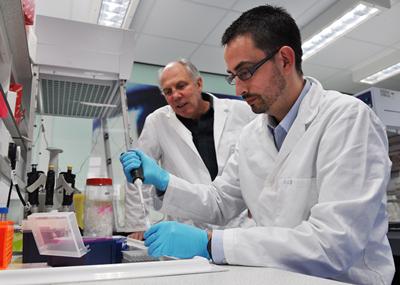Scientists gain new insight into brain inflammation during neurodegenerative disease

Scientists from the Centre for Biological Sciences have been able to provide new insights into the inflammatory reaction that occurs in the brain during neurodegenerative diseases, by studying the behaviour of the brain’s immune cells.
A new study by researchers at the University will help to focus future research and treatment into diseases like Alzheimer’s, by establishing which cells do and do not contribute to inflammation in the brain.
The brain's inflammatory response occurs in a number of chronic neurodegenerative diseases, including Parkinson’s, Huntington’s and prion disease, and contributes to the decline of cognitive processes. The inflammation is amplified by an increase in the population of microglial cells, a specific type of cells that reside in the brain.
The new research suggests the population of microglial cells is not increased by circulating immune cells (called macrophages) from other parts of the body, which can enter the brain through damaged blood vessels under certain conditions.

It had been assumed that if microglial cell increase was influenced by these travelling macrophages entering the population, the circulating cells could be used to administer treatments or targeted to reduce the inflammation.
However the new research, which uses an experimental model of prion disease, suggests the circulating cells don’t infiltrate the microglial population, meaning scientists can now focus future research and therapies directly on the microglial cells themselves.
Dr Diego Gomez-Nicola, from the CNS Inflammation Group at the University of Southampton and lead author of the paper, says: “Analysing how the expansion of microglia takes place is crucial to understanding the inflammatory reaction that accompanies diseases like Alzheimer’s. If we can regulate this expansion we may be able to delay the progression of the inflammation and therefore maintain cognitive processes for longer.”
Coauthored by Sjoerd Schetters and Professor Hugh Perry, the study also found that other types of immune cells, such as those living at the interphase of the vascular system with the brain, do get replaced by circulating macrophages.
Dr Diego Gomez-Nicola added: “This study shows how different immune cells could have opposing behaviours and probably different contribution to disease progression. It helps us to understand the dynamics of the brain’s innate immune response during neurodegenerative disease.”
The research has been published in the research journal Glia and was funded by the Medical Research Council (MRC), the European Union Seventh Framework Programme and Alzheimer’s Research UK.

